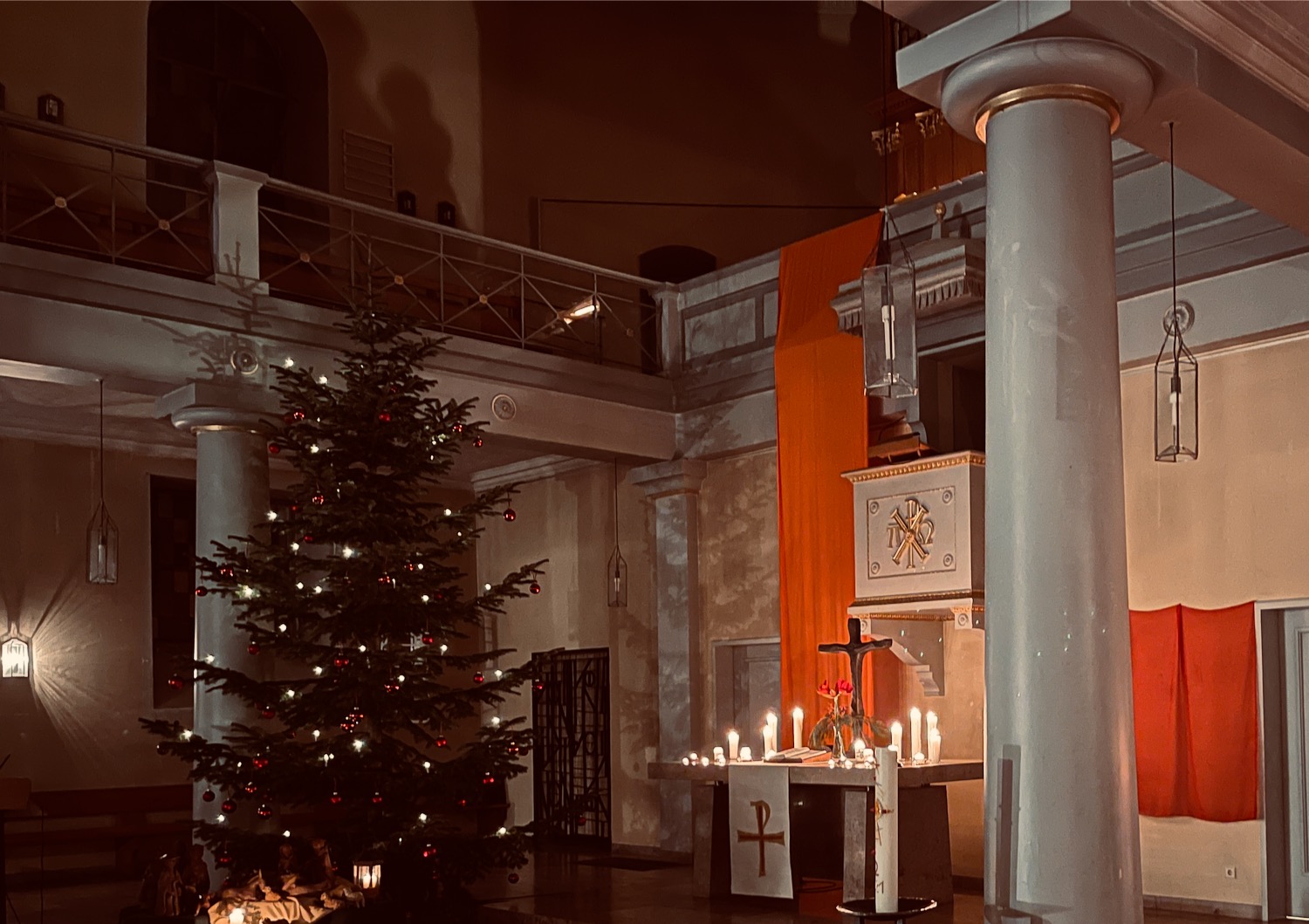
Death has stared us in the face in a particularly pernicious way during the pandemic. Not only has it made us value what we often take for granted, it has drawn our attention to the death of many things we hold dear and to death itself.
Jesus, Born To Die
Let me preface this reflection by noting that this is still a travel blog, I am not a pastor or theologian, but I do like to offer an annual Christmas reflection.
Last night I attended a midnight Christmas candlelight service in Germany (pictured above). It was quite emotional to be back in church singing familiar carols and hearing familiar readings after church doors were shuttered so long due to the pandemic.
Remote church is not church; there is no substitution for in-person gatherings and that goes for business meetings and family gatherings as well.
And yet while some in-person gatherings have resumed, many traditions remain dormant or have been buried. Our life seems forever altered in our new state of unease over a virus that will continue to be with us for years to come.
Some have chosen to coexist with the virus more than others: I’ve certainly tried to return to normality, but ubiquitous masking requirements, social gathering restrictions, and the economic devastation caused by our reaction to the pandemic has left scars..and for millions of people around the world who have seen friends or family die with COVID-19, an empty seat at the table.
Thus, as we mourn the loss of what we hold dear, we are left staring death in the face. Most will not die from COVID-19, but we will all die: from dust we came and from dust we shall return. But is that really our last chapter?
The story of Christmas is not just that Jesus was born, but that He was born to die. In a most unjust and inhumane way, Jesus was put to death, nailed to a Roman cross like a common criminal for a crime He was not guilty of.
And that was part of the plan; a plan to save humanity from themselves and offer the hope of a world in which death and suffering are but a distant memory. How? In that act of sacrifice, Jesus took upon Himself the sin of this world, an infinite God pouring out Himself on our behalf. This wasn’t an abusive Father punishing His Son for an offense He did not commit, but an act of love that should be an inspiration to us all.
Asking the why questions are often not helpful. Why does God allow suffering? Why is this world so bad? Why has this virus (and our response to it) ravaged us? Sometimes, our response should simply be one of lamentation. Lament is a powerful tool which allows humanity to empathize with each other and demonstrate love. We humbly concede that we cannot answer every question in life, even as we attempt to do so and pursue justice.
We lament loss and lament death, but rejoice that Jesus provides an antidote to ultimate death. We don’t understand many things in this cruel world, but even as we seek to understand and overcome by utilizing tools like the scientific method, we rejoice that the gift of love transcends the bleak midwinter.
CONCLUSION
On this Christmas, let us not forget the story of the Christ child is not just that He was born, but that He was born to die; and through His death and victory over it, death is defeated and we are offered hope for a new kingdom in which death has no place.
Merry Christmas.




Merry Christmas!!!
You touched me, brah.
Amen – Merry Christmas.
Merry Christmas to all here.
Ein gesegnetes Weihnachtsfest!
Perhaps through loss and suffering, we too learn, learn the value of things we my other wise take for granted. Like travel and family.
Thank you Matthew for this meaningful reflection, especially in this season.
I have been looking forward to this … and had almost given up. I thought perhaps there was something transcendent in the holiday videos or in the narrative about the retirement of your barber — I might get back to those posts individually.
There is no denial that this virus has indelibly altered the lives of many families this Christmas — my best friend in college and another dear friend at church are absent on earth. But as you have correctly pointed out that there is a Resurrection Day that we look forward to.
Your main focus is travel and I understand the need to be careful about your choice of words. But I do feel compelled to clarify two major elements of your reflection. The “calamity of this world” that Christ took upon Himself is indeed our own “sins” as individuals — to put it in an old fashioned way. I know, I know … “sin” has been cancelled; what rock have I been hiding under? The calamities, including this virus and our response to this disease, are the just and painful consequences of our missing the mark.
What then is the reason for the hope that you are referring to, and how can we be confident that death has been defeated? That is what we celebrate on that blessed Resurrection Day; strike that: true believers celebrate that every day and every moment of our lives. There is no defeat of death and hence no hope without the resurrected Christ who offers new life to all who may come.
That brings me to Michael Gerson’s Opinion today in Washington Post: “This Christmas, hope may feel elusive. But despair is not the answer.” A MUST read, if I may say. I’ll let you and the readers reflect on it.
Merry Christmas!
Thanks for your note. Appreciate it. I don’t shy away from the use of the word sin, though I do think the word must be developed more clearly in a post-Christian culture and my focus was pointing out humanity’s need for redemption (in some sense, we can all see how bad this world is and understand the sin problem is self-evident if we honestly reflect upon our own lives).
As for resurrection, I do confess the resurrection (John 11:25-26, 1 Peter 1:3), but it was Jesus’ death, not His resurrection that paid a substitutionary price for sin. By His resurrection we know that the Father’s wrath was satisfied, but it was His death (the shedding of blood) that covered our sin and while resurrection was a testament to the sufficiency of that act, it was the proof, not the act of redemption.
Thanks for your note. Appreciate it. I don’t shy away from the use of the word sin, though I do think the word must be developed more clearly in a post-Christian culture and my focus was pointing out humanity’s need for redemption (in some sense, we can all see how bad this world is and understand the sin problem is self-evident if we honestly reflect upon our own lives).
As for resurrection, I do confess the resurrection (John 11:25-26, 1 Peter 1:3), but it was Jesus’ death, not His resurrection that paid a substitutionary price for sin. By His resurrection we know that the Father’s wrath was satisfied, but it was His death (the shedding of blood) that covered our sin and while resurrection was a testament to the sufficiency of that act, it was the proof, not the act of redemption.
Hello Matthew,
On the topic of sin, the thing that I most admire about Christianity is its core idea of divine forgiveness. Feelings of profound guilt from wrongs/sins done by one unto others and malignment from wrongs/sins done unto one by others are destructive and can essentially create hell on Earth for the sufferer. Divine absolution can provide relief from such torment, depending on the degree of one’s faith. I interpret the idea of Christ’s death “paying” for humanity’s sin as an allegory and perhaps an enabling premise for the former idea of being able to receive divine forgiveness (via Christ’s sacrifice) by simply asking. In any case, thank you for your lovely post.
Jesus is one way, not the only way. The “one and only way” arrogance oozes from modern day Christians. It is not the way of Jesus, but of his misguided followers. May you find peace in Christ and learn the wisdom to know humility in your spiritual path.
Very well put. I would say that Jesus does embody The Way, but that there are many embodiments/manifestations.
Merry Christmas!
Well said Matthew! Merry Christmas and best wishes for the New Year!
Merry Christmas and it sounds like the service was inspiring. But, I have to say – aren’t we all born to die? Isn’t everything, including our universe born to die? Spirituality and faith mean different things to different people — to me Christmas is about being a small part of a bigger ecosystem and doing the right thing for not only me but my fellow humans and environment. Life is short and meant to be cherished.
Thanks for sharing this and for pointing your readers to Jesus in a loving and authentic way. Merry Christmas!
Thank you for your commitment to witness.
Today, He was born. Every day, He is risen.
Merry Christmas Mr. Matthew Klint! What a well written commentary on the miracle of the birth of Jesus Christ. May we find and enjoy the Hope, Peace, Joy, and Good Will that this season brings. God Bless!
Merry Christmas
This is the most upsetting Christmas article I’ve ever read. Disease, death, violent bloody capital punishment, decaying bodies turning to dust, and the unsubstantiated claim of a fairy tale afterlife are depressing. Adding “Merry Christmas” at the end of this article seems like sarcastic humor. There’s plenty to be joyous of: beauty found in nature and the kindness of strangers on the road. Let’s celebrate life while we still have it. Live in the moment, not the past nor the future. Merry Christmas.
The (biological) purpose of life is to reproduce and then die. That’s all.
Ed, as long as the moments ✨ you live in include empathy, you will prosper.
Merry Christmas Matthew!